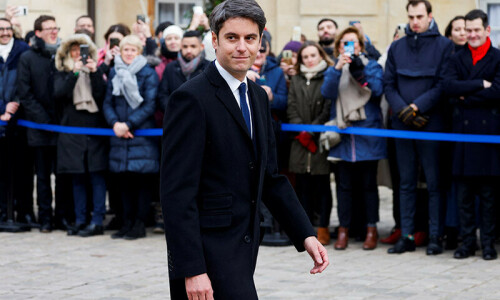In a surprising move to invigorate his second term, French President Emmanuel Macron has appointed 34-year-old Education Minister Gabriel Attal as the country’s youngest and first openly gay prime minister. This decision is seen as an attempt by Macron to rejuvenate his centrist party’s prospects in the upcoming European parliament elections and move beyond the controversies of the past year.
Aiming for Renewal
Macron’s choice of Gabriel Attal as the new prime minister is a strategic move to signal a desire for change and reset his political agenda. While Attal’s nomination may not result in a drastic shift in policies, it reflects Macron’s intention to distance himself from the unpopular pension and immigration reforms of the previous year. The president hopes to strengthen his party’s position in the face of increasing challenges from far-right leader Marine Le Pen’s party, which currently holds a substantial lead in opinion polls.
Youthful Leadership
At 34, Gabriel Attal becomes the youngest prime minister in French history, bringing a fresh and youthful perspective to the political landscape. Macron and Attal, with their combined age just below that of U.S. President Joe Biden, aim to appeal to a younger demographic and energize their support base. Attal’s popularity in recent months, as evidenced by his high polling numbers, suggests that he has already established a positive image among the French public.
Historic Milestone
Beyond his age, Attal also breaks barriers by becoming the first openly gay prime minister in French history. This historic milestone aligns with Macron’s broader vision of a more inclusive and diverse France. The appointment sends a powerful message of acceptance and represents progress in a country where LGBTQ+ rights have been a significant point of discussion and activism.
Challenges Ahead
Despite the symbolic nature of Attal’s appointment, the challenges facing the Macron administration remain significant. Struggling with a lack of a working majority in parliament, Macron has had difficulty advancing his reform agenda, which has shifted towards the right to appeal to conservative voters. The president’s party currently trails the far-right leader Marine Le Pen’s party in opinion polls by a substantial margin.
Uncertain Path Forward
Attal replaces Elisabeth Borne, who faced challenges during her tenure, marked by protests over pension reforms and riots related to a police shooting. The new prime minister and Macron may take several days to finalize the composition of the new government, suggesting a careful approach to this political transition. Macron’s opponents remain skeptical, seeing the reshuffle as a strategic move to maintain popularity rather than a genuine commitment to substantial change.
Gabriel Attal’s appointment as France’s youngest prime minister reflects President Macron’s pursuit of a political reset. As Macron navigates the challenges of a shifting political landscape, Attal brings a youthful and dynamic energy to the leadership. Whether this move will lead to significant policy changes or merely serve as a symbolic gesture remains to be seen, but it undoubtedly marks a historic moment in French politics. As the new government takes shape, its ability to address the pressing issues facing France will determine the success of Macron’s strategy for revitalization and electoral success in the upcoming European parliament elections.
















